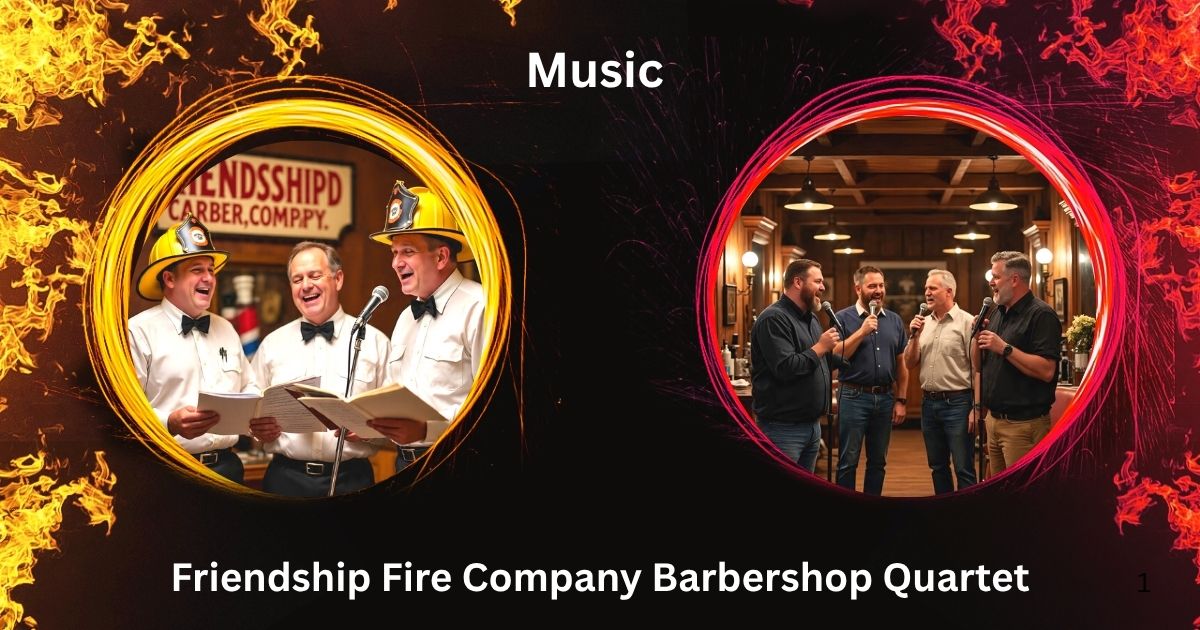The Friendship Fire Company Barbershop Quartet is a fascinating blend of two deeply rooted American traditions — volunteer firefighting and the harmonious style of barbershop music. This unique combination captures a sense of community spirit, musical passion, and dedication to preserving cultural heritage. While barbershop quartets are well-known for their distinctive four-part harmony, a group like the Friendship Fire Company Barbershop Quartet also reflects values such as teamwork, service, and fellowship that are equally vital in both firefighting and music.
In this article, we will explore the history, traditions, and cultural importance of the Friendship Fire Company Barbershop Quartet, along with its connection to local communities, music competitions, and volunteer firehouse camaraderie.
The Origins of Barbershop Music
Barbershop music is a style that emerged in the late 19th and early 20th centuries in the United States. It is characterized by four vocal parts — lead, tenor, baritone, and bass — singing in close harmony. While its roots are often associated with African American musical traditions, it gained nationwide popularity through community gatherings, vaudeville shows, and early recording technologies.
The structure of barbershop harmony creates what singers often call a “lock and ring” sound, where chords resonate so perfectly that they produce overtones. This enchanting musical quality made barbershop quartets popular in civic events, fairs, and even in volunteer organizations like fire companies.
Volunteer Fire Companies and Music Traditions
Volunteer fire companies have long been centers of community life in small towns and cities across America. These organizations are not only dedicated to protecting lives and property but also to fostering a sense of unity through social events, fundraising, and public performances.
The Friendship Fire Company Barbershop Quartet is a perfect example of how music becomes an extension of a fire company’s community outreach. Singing at local parades, charity events, and annual dinners, such quartets strengthen bonds between the firehouse and the people they serve.
Formation of the Friendship Fire Company Barbershop Quartet
While exact historical records may vary, the Friendship Fire Company Barbershop Quartet likely formed as a fun side project among members of a volunteer fire department who also happened to be passionate singers. The name itself reflects a tradition where many firehouses carry names like “Friendship” or “Liberty,” highlighting ideals of unity and mutual aid.
Often, such quartets begin informally — perhaps a few firefighters harmonizing during downtime at the station — and evolve into a recognized performing group. Over time, they may become local favorites, invited to sing at civic functions, holiday gatherings, and even compete in regional Barbershop Harmony Society events.
Role in Community Events
The Friendship Fire Company Barbershop Quartet does more than just entertain. Their performances often serve as:
- Fundraisers – Helping raise money for firefighting equipment, training programs, or community initiatives.
- Public Relations – Creating goodwill between the fire company and the residents.
- Cultural Preservation – Keeping the barbershop tradition alive for younger generations.
- Ceremonial Participation – Singing at memorials, firefighter appreciation events, or civic award ceremonies.
These appearances reinforce the idea that volunteer fire companies are about more than emergency response — they are pillars of the community.
Musical Repertoire and Style
Like most barbershop quartets, the Friendship Fire Company Barbershop Quartet would likely draw from a classic repertoire including:
- Traditional Barbershop Standards – Songs like Sweet Adeline or My Wild Irish Rose.
- Patriotic Music – Popular during parades and national celebrations.
- Holiday Carols – Ideal for Christmas tree lightings or winter festivals.
- Contemporary Arrangements – Modern songs adapted into barbershop harmony for broader audience appeal.
Their singing style would emphasize blend, balance, and expressive interpretation, reflecting both musical training and the teamwork mentality common in firefighting.
The Intersection of Music and Firehouse Culture
Life in a volunteer fire company demands trust, coordination, and dedication — the same qualities that make a barbershop quartet successful. In both settings, every member plays a vital role. If one singer is off pitch or a firefighter misses a step, the team’s performance suffers.
This parallel creates a special chemistry when a fire company also functions as a performing group. Singing together reinforces camaraderie, reduces stress, and gives members a creative outlet outside the intense demands of emergency service.
Participation in Competitions and Festivals
Barbershop quartets frequently participate in regional and national competitions. While the Friendship Fire Company Barbershop Quartet may have its roots in local service, joining such events allows them to showcase their talents, connect with other musicians, and represent their community on a broader stage.
Competitions often judge groups on vocal quality, harmony accuracy, stage presence, and overall entertainment value. For a fire company quartet, success in these contests not only boosts morale but also brings prestige back to their hometown.
Preserving Tradition for Future Generations
One of the challenges facing both volunteer fire companies and barbershop quartets is attracting younger members. The Friendship Fire Company Barbershop Quartet serves as a bridge, showing that tradition can be fun, relevant, and community-focused.
By inviting local youth to rehearsals, performing in schools, or mentoring aspiring singers, the group can help keep both firefighting and barbershop music alive for decades to come.
Why It Matters
The Friendship Fire Company Barbershop Quartet is more than a novelty — it’s a living example of how community service and the arts can merge to create something greater than the sum of its parts. Their music celebrates harmony, not only in sound but in the spirit of working together for the common good.
From preserving American musical heritage to strengthening bonds between neighbors, the quartet embodies the best of both worlds: the dedication of volunteer firefighters and the joy of music.
